


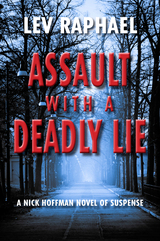
A novel of suspense set in the academic world, Assault with a Deadly Lie probes the disturbing psychological impact of slander, harassment, stalking, police brutality, and the loss of personal safety. What will Nick do when his world threatens to collapse? How can he reestablish order in a suddenly chaotic life?
Assault with a Deadly Lie, the eighth installment of Lev Raphael's Nick Hoffman Mysteries, propels the series to a new level of danger and intrigue as Nick and Stefan are catapulted out of their tranquil existence by shocking accusations.
Finalist, Midwest Book Award for Mystery/Thriller Fiction, Midwest Independent Publishers Association
“A riveting great read for mystery/suspense fans, author Lev Raphael once again documents his impressive gifts as a storyteller, holding the reader’s rapt attention from beginning to end with unexpected plot twists and surprise twists.”—Jack Mason, Midwest Book Review
“Raphael portrays with frightening power the wrenching experience of victimization by the corporatized, PR-prioritized groves of academia, where both men teach, and by local authorities militarized into SWAT teams practicing police brutality. . . . The compelling core of this unusual novel is Raphael’s depiction of the agonizing reality of victims’ shame, in which someone ‘feels doubly exposed talking about the violation’ and so says nothing.”—Booklist
“Professor Nick Hoffman learns that even tenure can’t guarantee real security.”—Kirkus Reviews

“So, as you see, I am familiar with the case. However, we can’t discuss it unless you learn more about some other court cases, so that you can compare your father’s trial with other, more baffling cases, and see it in the context of the madness that reigned at the time.”
Ján Johanides’ riveting Slovak novel immediately thrusts you into the midst of a bewildering second-person dialogue, bestowing the reader with the role of a silent partner in a one-sided conversation with a mysterious archivist. As the story unfurls piece by piece, it becomes clear that the archivist, who can’t seem to stay on topic, has both a tragic history and the key to unlocking your family’s darkest secret, a secret that may or may not involve the Czechoslovak secret police, American and Soviet intelligence, Israeli politics, and a tire full of dollars.
Set after the fall of the Soviet Union and the dissolution of Czechoslovakia, But Crimes Do Punish is awash with paranoia, revealing how the madness of the Communist era continues to bleed into the instability of the present. Written in 1995, this haunting novel—the first work of Slovak fiction published by Karolinum Press—evokes the spirit of John le Carré and the style of Carlos Fuentes while illuminating issues that still plague post-Communist Europe.

In the frozen reaches of Michigan’s Upper Peninsula, fierce winter storms hit without warning. The white opacity of one such blizzard allows Norman Haas to walk away from his prison work detail. Dangerously close to freezing to death, Norman is given shelter by Liesl Tiomenen, a middle-aged woman who lives in a house she and her late husband built in the woods. Armed with a rifle, she tries to turn him in, but when they set out on snowshoes, she suffers a fall, allowing him to flee again. Thus begins Norman’s journey back to his past, back to the woman he loved who betrayed him, back to the brother who helped put him away, back to a dangerous web of family allegiances, deceptions, and intrigue.
After finding Liesl injured and abandoned in the woods, Yellow Dog Township’s sole full-time law enforcement officer Del Maki pursues Norman through a storm of mythic proportions.

Cold Deck is the exciting story of an ordinary man who finds himself in extraordinary circumstances. Moving from Las Vegas’s mean streets to the insider’s world of casino workers, this is a story of survival set against the greed, fears, and glitz of Sin City.
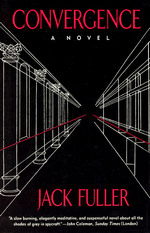
"An intelligent, readable novel about two kinds of intrigue—international and bureaucratic. He succeeds admirably at both tasks."—Ross Thomas, Washington Post
"A solid, provocative first novel about the 'deadly game of espionage' . . . Thoughtfulness and human frailty take precedence over action and suspense. Irony is the prevailing mode. . . . Fuller depicts intelligence work—its technical minutiae and its vaunted goals—convincingly. And he subtly weaves various parallels into complementary layers of potential convergence."—Jeffrey Burke, Wall Street Journal
"A fast-moving, dramatic, thinking person's spy novel."—Nelson DeMille, Newsday

These are tales of seekers, often damaged, who find themselves caught up in skewed realities, facing lurking threats, violent deaths, strange entities, and alienating technologies. Confronted with unsettling, escalating, circumstances, the disparate cast of characters are driven toward self-revelation and perverse moments of poignancy.
A troubled high schooler traps a peer in an underground storage space. A traumatized felon returns home to rob the man who molested him as a child. A videogame help-line operator suspects a regular caller, obsessed with a disturbing role-playing game, of real-life misdeeds. In the title story, an unhappy couple adopts a “designer animal,” a genetic hybrid created to be the perfect pet. But the “grot” makes trouble in the neighborhood, becoming emblematic of a deeper problem. “Something is wrong with the world,” the narrator’s husband explains. “A design flaw. It’s so thoroughly corrupted, I’m not sure how to fix it.”
Inventive and unpredictable, these thirteen stories are wholly immersive, showing Sheehy at his captivating best.

To aid him in the chase, Malden calls on his colleague, the awkward, remote, intimidatingly tall Sonja Nielsen. She reluctantly agrees to help, either because of or despite her previous entanglements with Malden.
Told from the perspectives of these three characters, the story swerves and jolts and switches back, much like Percy’s recollections of his upbringing. Kersting presents the interior struggles of her characters in a searingly spare style, all the while drawing the reader through an escalating series of events as Percy hitches rides and takes buses, searching the small towns of central Michigan, alternately helped and hindered by both old and new acquaintances.
While following disparate leads toward Percy’s final, surprising destination, all three conflicted souls are compelled to examine their loyalties, test their convictions, admit their frailties, and confront the ghosts lurking in their pasts, resulting in a revelatory climax.

A deputy minister in the Communist Party of Czechoslovakia, Ludvík enjoys all the luxuries that success in the party affords him, but he must be careful: he’s under no illusions about the secret police bugging his apartment. Luckily, he and his wife, Anna, know where the bug is and where they can safely converse. However, any comfort they feel disappears the evening they attend an official party, where they learn that Ludvík’s boss has just been arrested after presenting a report written by Ludvík himself. Is Ludvík next? Back home after the party, the couple must get past unresolved marital tensions to get rid of absolutely anything that could incriminate them—all while contending with the strange men outside their apartment and the bug inside.
Penned under the oppressive watch of Soviet authorities in 1960s Czechoslovakia—but touching on still-current themes of surveillance and paranoia—this cinematic thriller is as tense and timely as ever. A promising Party member who became persona non grata after the Soviet occupation of Czechoslovakia, author Jan Procházka knew firsthand the gnawing terror of life in a surveillance state: after his death in 1971, the new tenants of his apartment discovered twelve hidden listening devices. As Ear makes terrifyingly clear, the most frightening horror stories are the ones closest to everyday reality.

An American literary take on the Nordic noir genre
Unfolding during the moody Pacific Northwest winter of 1951, we follow Bernadette Baston, scholar of child development and language acquisition, as she travels to a penitentiary on the remote island Elita in the Puget Sound to consult on a curious case: two guards have discovered an animal-like adolescent girl living alone in the cold woods beyond the prison’s walls. There are few answers, but many people who know more than they are saying. According to official reports, the girl, dubbed Atalanta, does not speak. Is her silence protecting someone? The prison warden, court-appointed guardian, and police detective embroil Bernadette in resolving a secret that the tight-knit island community has long held, and her investment in the girl’s case soon becomes more personal than professional. As a mother, wife, and woman bound by mid-twentieth-century expectations, Bernadette strategizes to retain the fragile control she has over her own freedom, identity, and future, which becomes inextricably tied to solving Atalanta’s case.
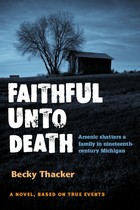
Benzonia, Michigan, 1894: a sleepy Congregationalist community, dedicated to the education of hardworking and virtuous young people of both sexes and all races. Anna Spencer Thacker is the daughter of missionaries, a faithful wife, and mother of five, pious to a fault. She is suddenly stricken with a mysterious ailment that soon proves fatal. Was it truly an unfortunate illness? Or was it murder—or suicide?
Taking a true story of a murder in her own family, Becky Thacker has crafted a historical mystery novel whose cast of characters rapidly builds, including William Henry Thacker as deputy sheriff, deacon in his church, a kind man . . . but perhaps just a trifle too fond of the attractive young housekeeper; and Charlotte Spencer, the pretty missionary sister, almost saintly in her efforts to bring Jesus to the Armenians in the mountains of Turkey, though a bit prone to exaggeration. She could be a suspect—or the next target.
The children are Roy, 19: musical, a good student, but a little too wild for Benzonia; Ralph, 17: trying to shoulder the responsibilities of farm and family; and Lottie, 14: a talented young artist trying to take care of young Will and Josie. Faithful Unto Death provides a window into the daily lives of small-town Michiganders at the turn of the century wrapped up in a riveting whodunit.
Cover image by Hemera/Thinkstock

A story of love, vengeance, and renewal, Fire Point depicts the young couple’s attempt to rebuild their lives. But when Hannah’s former boyfriend Sean Colby returns home after a mysterious early discharge from the army, he cannot accept the fact that she has a new lover and commits a series of increasingly violent acts against Hannah, Martin, and the house that has come to represent their future.


A chilling, timely reminder of the moral and human costs of racial hatred.
What happens when a delusional white supremacist and his army of followers decide to create a racially pure “Little Europe” within a rural Tennessee community? As the town’s residents grapple with their new reality, minor skirmishes escalate and dirty politics, scandals, and a cataclysmic chain of violence follows. In this uncanny reflection of our time, award-winning novelist Charles Dodd White asks whether Americans can save themselves from their worst impulses and considers the consequences when this salvation comes too late.
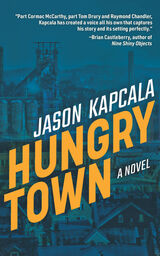
“A literary page-turner. . . . Part Cormac McCarthy, part Tom Drury and Raymond Chandler, Kapcala has created a voice all his own.” —Brian Castleberry
One October night in the depressed steel town of Lodi, Ohio, two police officers respond to a call about trespassers in the derelict Lodi Steel machine shop. A chase through the crumbling cathedral of steel columns launches a chain of events that will test the officers’ partnership and leave a boy to fend for himself in a decaying Rust Belt neighborhood choked by joblessness, boredom, and addiction.
On the opposite end of town, a young woman steps out of a rust-bucket Grand Marquis into an all-night diner. Instead of luggage, she carries mementos: an ankh tattoo she inked herself and a wallet-sized photograph of a boy who disappeared. She doesn’t realize her ex-boyfriend has hired two brothers to track her down and bring her back, by any means necessary.
The complex female leads of Hungry Town, with its sharp dialogue and poetic sensibility, turn classic noir and cop drama tropes on their heads. These morally complicated characters weave in and out of each other’s lives, sometimes violently, sometimes with surprising compassion.

After Sam's mother dies and is cremated, her ashes are stolen. Believing that his father is responsible, Sam pursues the man he has not seen in years. He discovers that he is not the only one searching for his father—federal agents, a disgraced politician, a retired Boston cop, and several journalists join the chase.
“The Invisible World is more than a first-rate political thriller,” says The Boston Globe. “It’s an absorbing tale of alienation and loss, and the ramifications of a rootless, troubled family.” What Sam Adams ultimately discovers is that the shadowy realm of conspiracies conjures a world of hidden truths and intrigue in which the familiar is the most mysterious force of all.


Jelena Volić and Christian Schünemann’s latest thriller follows a case for criminologist Milena Lukin, the protagonist of their previous novels Cornflower Blue and Peony Red. Set in Belgrade, a city of flux between East and West, Lily White is a complex and riveting new story that once again will take Lukin to the dark heart of Serbia’s past.
Bouquets of white lilies are mysteriously laid in a Belgrade street where, years earlier, a small Romani boy was beaten to death by two youths. One of the attackers was apprehended and imprisoned. The other was allowed to flee and, after twenty-five years on the run, he returns to Belgrade to confront his past. Days later, his corpse is found floating in the Danube River. After a cursory investigation, the police declare it to have been suicide and close the case, but the dead man’s lawyer and the criminologist Milena Lukin begin an investigation of their own. They soon stumble upon a clue that leads them into the darkest recesses of Serbian politics and to the root of a murder that shaped the fate of a country.
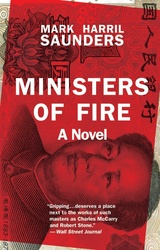
Kabul, Afghanistan, 1979: CIA station chief Lucius Burling, an idealistic but flawed product of his nation’s intelligence establishment, barely survives the assassination of the American ambassador. Burling’s reaction to the murder, and his desire to understand its larger meaning, propel him on a journey of intrigue and betrayal that will reach its ultimate end in the streets of Shanghai, months after 9/11. A Chinese dissident physicist may (or may not) be planning to sell his country’s nuclear secrets, and in his story Burling, now living quietly as consul, recognizes the fingerprints of a covert operation, one without the obvious sanction of the Agency. The dissident’s escape draws the violent attention of the Chinese internal security service, and as Burling is drawn inexorably into their path, he must face the ghosts of his past misadventures and a present world of global trafficking, fragile alliances, and the human need for connection above all.
Reminiscent of the best work of Graham Greene and John le Carré, Ministers of Fire extends the spy thriller into new historical, political, and emotional territory.

Chonville’s novel is at the vanguard of a new Antillean literature that moves beyond créolité (the last identifiable literary movement in the Antillean canon) in several important ways: first, although it does reflect on the past (as indeed prescribed by the créolistes), it is firmly anchored in the present, which Chonville, a trained social scientist, captures unflinchingly. Second, it complexifies the Antilles gender landscape with characters whose intersectional realities are explored with depth and care.

Helmut Sanchez is a young researcher in the employ of the renowned scholar Werner Hopfgartner. By chance Sanchez discovers a letter written in the 1950s by Hopfgartner mocking feelings of guilt over the Holocaust. Appalled, he digs into the scholar's life, determined to find the truth and finally uncovering the evidence of Hopfgartner's sordid past. Sure of his conclusions, Helmut decides that only one shocking act is morally correct. When he does, the consequences are immense, and the toll taken on his mind and conscience is amplified when one of his friends is wrongly accused of the crime-and is wrongly left to pay for it.
Intelligent and literate, The Nature of Truth breaks new ground in Latino literature, focusing on how a contemporary man of unique heritage--a Mexican-German who has come to America by way of Germany--navigates a complex moral universe and how his journey reflects the tension between justice and righteousness in American life.
Further information about the author can be found at his web site: <A HREF="http://sergiotroncoso.com">http://sergiotroncoso.com.</A>
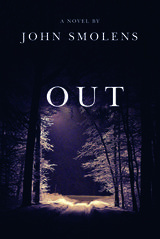

When a young couple is murdered in their home in Kosovo, police are perplexed: there seems to be no motive. But when Milena Lukin’s uncle realizes that the murdered woman was his first love, his niece decides to investigate. All too soon, she is embroiled in the twisted world of Balkan politics, where the past always weighs heavy on the present, and nowhere more so than in her hometown of Belgrade. Old prejudices and new hatreds, merciless profiteers and mendacious politicians—all come together to try to keep Lukin from finding the truth.
A fast-paced, deftly told thriller Peony Red drops readers into the murky Balkan underworld. Fortunately, in Milena Lukin, they have a strong, capable, no-nonsense guide, one whose adventures will always keep the pages turning.
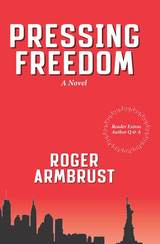
An investigative reporter for a statewide newspaper connects the dots on an interstate jewel fencing scheme which leads to the capitol city mayor’s door, and implicates a would-be governor. The reporter, a Vietnam vet whose keeps his black ops background under wraps, is attacked by rogue cops, who also threaten his daughter and his girlfriend. His USMC training, unknown to his assailants, saves him from serious injury, but danger on the national scene draws his attention. With a former United States Senator who shares his concern for the unstable new administration in Washington, the reporter finds himself in the midst of a plot to return the federal government to stability, but by means that shock him to the core. A political thriller born of our current national turmoil, this first novel by a seasoned journalist will leave the reader with wide eyes and a quickened heartbeat.

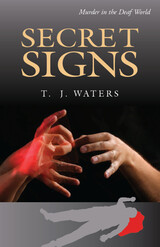
Former golf pro Amy Kellen, recently widowed and the mother of a three-year-old daughter, hoped that her new job as a video relay service interpreter for deaf clients would bring stability into her life. She also wished to stay close to the Deaf community that meant so much to her late husband, who was deaf. Little did she know, however, that her new profession would cause her to witness the vicious killing of a deaf client during a video call. In this way author T. J. Waters thrusts Amy into a murder mystery that catches her up in intersecting worlds of intrigue—Internet scams, burglaries, and presidential politics—all connected through the rich Deaf community in Washington, DC.
During the investigation, Amy meets local detective Mike Seer and Secret Service agent Heath Rasco. Despite Seer’s insistence, she refuses to violate her professional ethics and discuss the content of the fatal call. Agent Rasco, who is hard of hearing, admires her commitment to her deaf clients. Amy admits her own attraction to the agent, but her first concern is to learn more about how her client, a respected deaf political strategist, was killed. Her pursuit causes her to witness two more murders and discover a third. She also finds herself and her daughter the targets of assassins. Secret Signs brings these extraordinary elements together in an electrifying combination that promises to surprise and satisfy.

It’s the summer of 1963 and León Egea, a cocky nineteen-year-old student and aspiring author, has just finished his first year studying literature at the University of Granada and is starting a summer job as an encyclopedia salesman. León, infuriated by the injustices in Spanish society under the Franco dictatorship, comes to find that literature can speak the truth when the reality is clouded.
In this coming-of-age novel by renowned Spanish writer Luis García Montero, León discovers that, under the repressive Franco dictatorship, people, places, and events are not always what they seem. But literature, words, and names open paths to discovery, both personal and political. Through lyrical fast-paced narrative, Someone Speaks Your Name explores literature as a foundation for understanding human relationships, national character, discrete differences between right and wrong, and for pursuing the path forward. As León’s professor tells him: “Learning to write is learning to see.”

In the shadow of the "Monster of Florence," a serial murderer who has terrorized Italy for seventeen years, Laura Grimaldi sets her tense psychological thriller Suspicion—a noir mystery of a city transformed by fear, and of friendships and family ties twisted by uncertainty and dark speculation. Grimaldi, whose hardboiled mysteries of the 1950s earned her the title "Italy’s queen of crime," turns here to the deeper, more elusive and disturbing questions that haunt human affairs.
For years Matilde, the widow of a prominent Florentine doctor, has lived alone with her eccentric middle-aged son, Enea. When the police pay a call, the balance between mother and son is shifted just subtly enough to make Matilde prey to suspicions and doubts that grow ever more corrosive, ever harder to conceal and more dangerous to reveal. In the literary tradition of such mystery writers as Patricia Highsmith and Ruth Rendell, Grimaldi creates an atmosphere charged with suspense as the daily lives and routines of her characters, infected with suspicion, begin to rearrange themselves around a few frightening facts and infinite monstrous possibilities.
Matilde’s efforts to decipher Enea’s secretive movements and occupations appear perfectly sensible and defensible through Grimaldi’s deft shifts between mother and son—and another, chillingly detached perspective on the gruesome murders. Grimaldi’s readers will find themselves as subject to misinterpretation and doubt, to sympathies and suspicions as her Florentine characters, and spellbound until the book’s final page.


When Ray’s train is delayed in Lorena, a Gold Rush outpost turned college town, he meets Alice. Together they embark on a romance that tempts him to stay. By the time Ray arrives in San Francisco, Scotty has abandoned his bartending job, his rented room, and his scant belongings and skipped town with a married woman from Lorena. Now Ray has more than one reason to return.
A preeminent American writer who thrives on reinvention, Major returns with an unforgettable exploration of life on the brink of sweeping change. With spare prose and subtle poignancy, Thunderclouds in the Forecast probes love, loyalty, and belonging. As Toni Morrison wrote, “Clarence Major has a remarkable mind and the talent to match.”

Unmoored and seeking connection, Sandra also meets Lee, a single mother with a drinking problem, and begins babysitting her daughter. But Sandra can’t stop herself from continuing the correspondence with Ryan, in the process uncovering more about her husband—and Ryan herself. A novel that forces us to question how much of a person, even those closest to us, remains obscure, Under the Spell reveals the astonishing, transformative power of grief. This compelling study in bereavement joins classics such as Don DeLillo’s The Body Artist and Joan Didion’s The Year of Magical Thinking.


READERS
Browse our collection.
PUBLISHERS
See BiblioVault's publisher services.
STUDENT SERVICES
Files for college accessibility offices.
UChicago Accessibility Resources
home | accessibility | search | about | contact us
BiblioVault ® 2001 - 2025
The University of Chicago Press









